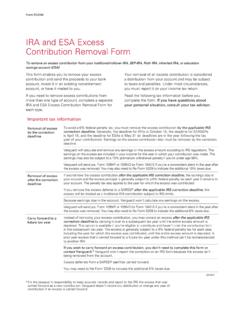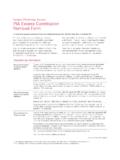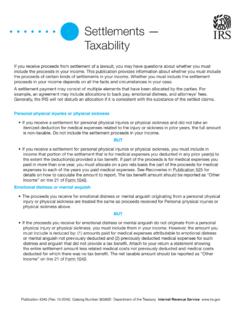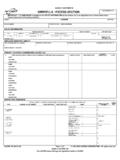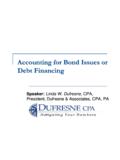Transcription of BECAUSE Income Taxation of Life Insurance YOU ASKED
1 PAGE 1 OF 14 ADVANCED MARKETSNot valid without all of Contents1. How is life Insurance defined under the Internal Revenue Code ( IRC )? 2. Is the death benefit payable upon the death of the insured subject to Income Taxation ?3. Are cash value increases taxable to the owner?4. When are withdrawals subject to Income tax?5. How is the recapture ceiling for withdrawals and surrenders calculated?6. How is the investment in the contract calculated? What is the difference between investment in the contract and basis? 7. What are the tax implications of withdrawing cash value or taking a policy loan immediately before or after a 1035 exchange? 8. What are the Income tax consequences of policy surrender resulting in a gain?
2 Does the same hold true for policies that are sold versus surrendered? 9. What are the Income tax consequences of policy surrender resulting in a loss?10. Are policy loans taxable?11. Is the interest on a policy loan deductible?12. Are dividends received from a life policy taxable? 13. What are the Income tax consequences of paid-up additions versus accruing dividends in a whole life policy?14. How are Modified Endowment Contracts (MECs) taxed? 15. What is the Taxation of a life Insurance policy that does not meet the statutory requirements of IRC 7702?16. What is the Transfer-for-Value Rule?17. Are premiums paid on personal life Insurance deductible? 18. What is the Taxation of charges against cash value for a Long-Term Care (LTC) Rider?
3 19. What is the tax treatment of employer-owned contracts under IRC 101(j)?20. How is group term Insurance taxed to an employee? 21. Are premiums paid by an employer for life Insurance tax deductible by the employer?22. What are the tax implications if an employer owns a policy on an employee s life but allows the employee to name a beneficiary for some or all of the death benefit? 23. What are the special Taxation rules applicable to ownership of a life Insurance policy by a C corporation? Income Taxation of life InsuranceADVANCED MARKETSBECAUSE YOU ASKEDThe following information provides a general overview of the Income Taxation of life Insurance policies as well as addresses some of the most frequently ASKED questions that we receive on the topic.
4 Residency and citizenship are assumed throughout this guide. PAGE 2 OF 14 ADVANCED MARKETSNot valid without all MARKETS BECAUSE YOU ASKED1. How is life Insurance defined under the Internal Revenue Code (IRC)? As part of major legislation enacted in the 1980 s mostly notably the Tax Equity and Fiscal Responsibility Act of 1982 (TEFRA) and the Deficit Reduction Act of 1984 (DEFRA) Internal Revenue Code 7702 was created. To qualify as life Insurance under 7702, a contract must meet either the cash value accumulation test or the two-pronged "guideline premium and corridor test" as follows: The cash value accumulation test (CVAT) often applies to traditional permanent life Insurance policies accumulating cash value and generally limits the cash value within a policy to the net single premium required to fund all future benefits provided under the The net single premium is calculated by using an assumed interest rate, mortality charges specified in the contract, and other specified charges.
5 A CVAT contract must satisfy the test at all times and must do so by the terms of the contract. The guideline premium and corridor test (GPT) often applies to policies where accumulating cash or maintaining a variable death benefit is most important. The test is a combination of two tests the guideline premium requirement and the cash value corridor requirement. The guideline premium requirement restricts the total premium that can be paid into the policy to a one-time premium that would fund the future benefits of the policy (taking into account an assumed interest rate and mortality charges). The cash value corridor requirement is satisfied if at all times the policy s death benefit exceeds a stated multiple of the contract s cash tests were created to ensure that sufficient mortality risk is maintained and prevent policies from being used merely for their tax-deferred cash accumulation feature.
6 A contract that fails to meet the testing requirements of 7702 will not be considered life Insurance and will not receive the same tax advantages that life Insurance receives. (See Question 15 for information on the Taxation of a policy that fails 7702 testing requirements). In 1988 as part of the Technical and Miscellaneous Revenue Act (TAMRA) Congress enacted additional testing requirements on life Insurance to once again deter the use of life Insurance solely as a tax deferred cash accumulation vehicle. This new test referred to as the 7-Pay Test limits the cumulative amount of premiums that can be paid into a contract in the first seven More specifically, a life Insurance contract will fail to meet this test if:Policies that fail to meet the 7-Pay Test, but otherwise meet TEFRA and DEFRA testing requirements, are considered to be Modified Endowment Contracts (MECs) and are subject to special Taxation rules.
7 The tax treatment of MECs is discussed in more detail in Question cumulative premiums paid into the contract during the first 7 yearsThe sum of the net level premiums that would have been paid if the contract provided for paid-up future benefits after the payment of 7 level annual premiums >PAGE 3 OF 14 ADVANCED MARKETSNot valid without all MARKETS BECAUSE YOU ASKED2. Is the death benefit payable upon the death of the insured subject to Income Taxation ?IRC 101(a)(1) provides that gross Income generally does not include amounts received under a life Insurance contract if such amounts are paid by reason of the death of the insured. In other words, life Insurance death benefits are usually not taxable Income to the beneficiary or beneficiaries of a life Insurance policy.
8 This tax-free treatment of death benefit applies to both traditional life Insurance contracts and to modified endowment contracts (MECs). Two notable exceptions exist with respect to this general rule regarding the tax-free treatment of Insurance proceeds: 1. proceeds received when there has been a transfer-for-value as specified in 101(a)(2); and2. proceeds received on an employer-owned contract that does not meet the requirements under 101(j) For more information on these exceptions, please see Q s 16 and 19, respectively. Furthermore, keep in mind that once the proceeds become payable, any interest or investment Income earned on the proceeds under a settlement agreement is also taxable. For example, if a beneficiary elects to receive Insurance proceeds payable in a series of installments, instead of as a lump sum, the principal portion will be tax-free, but any interest accrued will be taxable as ordinary Income .
9 3. Are cash value increases taxable to the owner? If a contract meets the definition of life Insurance under 7702, annual increases in cash surrender value will not be subject to Income taxes while the policy is in force. For as long as a policy remains in force, cash value buildup within a policy will experience indefinite tax deferral and if the policy terminates at death, any gains will generally be exempt from Taxation . See Question 23 for special rules pertaining to the Taxation of life Insurance owned by a C corporation. Although the deferral of Taxation on cash value growth is not specifically provided for in the tax code, this treatment is consistent with the tax treatment of other assets that are held by a taxpayer and not disposed of in any given year.
10 For example, a taxpayer is not taxed on the appreciation of stock values year to year unless that stock is sold or otherwise disposed principle is further supported by reference to the tax treatment of life Insurance policies that do not meet the statutory definition of life Insurance under 7702. Under 7702(g), Income on a life Insurance contract that does not meet the definition of life Insurance under 7702(a) will be treated as ordinary Income received or accrued by the policyholder during such year. The fact that the Code specifically states that life Insurance contracts that do not meet the 7702 definition are taxed year-to-year on the Income strongly suggests that generally a life Insurance policy that does meet the 7702 requirements will receive tax-deferred growth of the cash value inside the contract.

